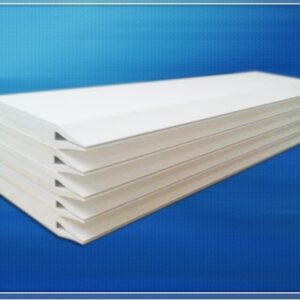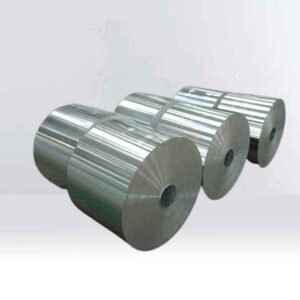At Yutwin Aluminum Foil, we understand that the choice of materials is critical to the success of any engineering project. Whether designing lightweight aerospace components, durable automotive parts, or innovative consumer electronics, selecting the right aluminum alloy can make all the difference. Today, we delve into two of the most widely used aluminum alloys in modern manufacturing: 6061 and 7075. These alloys are celebrated for their versatility, strength, and adaptability across industries, but they each bring unique characteristics.
Understanding the differences between 6061 and 7075 aluminum is essential for engineers and designers. While both alloys are part of the aluminum family, their distinct chemical compositions and mechanical properties make them suitable for different applications. One key factor that often influences material selection is the elastic modulus—a measure of a material’s stiffness. When it comes to the 6061 elastic modulus, this alloy stands out for its balance of flexibility and strength, making it ideal for applications where moderate stiffness is required without compromising on ductility.
But what exactly sets 6061 apart from 7075? This blog explores their chemical compositions, mechanical properties, welding performance, and application-specific advantages. We’ll also highlight why al 6061 elastic modulus is a critical consideration for projects ranging from automotive manufacturing to consumer electronics. Whether you’re optimizing for weight, strength, or cost, this comprehensive comparison will equip you with the knowledge to make informed decisions.
As a trusted supplier of high-quality aluminum products, Yutwin Aluminum Foil is committed to providing materials that meet the exacting standards of today’s industries. Our extensive inventory includes 6061 and 7075 alloys, each carefully manufactured to ensure consistency and performance. Whether you need sheets, plates, or custom profiles, we have the solutions to support your project requirements.
In the following sections, we’ll break down the technical specifications of these alloys, discuss their real-world applications, and explain why the 6061 elastic modulus is a standout feature for many engineers. By the end of this blog, you’ll have a clearer understanding of when to choose 6061 versus 7075 and how Yutwin Aluminum Foil can help you source the perfect material for your next innovation.
What is 6061 Aluminum Alloy?
6061 aluminum alloy is a widely used aluminum-magnesium-silicon alloy that is heat-treated to improve its properties. It features excellent workability, high strength, and good corrosion resistance, making it ideal for various industries such as aerospace, automotive, construction, and electronics.
Composition of 6061 Aluminum Alloy
The key elements in 6061 aluminum alloy are magnesium (Mg) and silicon (Si), which form the Mg2Si phase. The composition by percentage is as follows:
- Silicon (Si): 0.4-0.8%
- Copper (Cu): 0.15-0.4%
- Magnesium (Mg): 0.8-1.2%
- Zinc (Zn): ≤0.25%
- Manganese (Mn): ≤0.15%
- Chromium (Cr): 0.04-0.35%
- Iron (Fe): ≤0.7%
- Aluminum (Al): balance
الميزات الرئيسية
- Workability: 6061 aluminum alloy offers excellent machinability, making it ideal for cutting, drilling, and other operations that require high dimensional accuracy and a smooth surface finish.
- مقاومة التآكل: The alloy naturally forms a dense oxide layer, providing superior protection against corrosion.
- الخصائص الفيزيائية: With heat treatment (e.g., T6), the tensile strength reaches up to 310 MPa, compressive strength is 276 MPa, and elongation is 12%.
- قابلية اللحام: It has excellent weldability, making it suitable for various welding techniques.
- Anodizing: It offers excellent anodizing potential for color and decoration.
التطبيقات الشائعة
6061 aluminum alloy is used across various industries, including:
- الطيران والفضاء: For aircraft skin, fuselage structures, rotor blades, and propellers.
- النقل والمواصلات: In vehicle bodies, metro and railway carriage components, and engine parts.
- الإنشاءات: For doors, windows, curtain walls, and ceilings.
- الإلكترونيات: In laptop cases, mobile phone shells, and heat sinks.
- Other Fields: Packaging, printed aluminum, mechanical components, and more.
6061 aluminum alloy’s versatility makes it a widely used material in industrial and everyday applications.
What is 7075 Aluminum Alloy?
7075 aluminum alloy is a high-strength aluminum, zinc, magnesium, and copper alloy known for its excellent الخواص الميكانيكية and corrosion resistance. It is primarily used in aerospace, automotive, and military applications.
Composition of 7075 Aluminum Alloy
The primary alloying elements of 7075 aluminum are zinc (Zn), magnesium (Mg), and copper (Cu). The composition by percentage is as follows:
- Silicon (Si): ≤0.40%
- Iron (Fe): ≤0.50%
- Copper (Cu): 1.2-2.0%
- Manganese (Mn): ≤0.30%
- Magnesium (Mg): 2.1-2.9%
- Chromium (Cr): 0.18-0.28%
- Zinc (Zn): 5.1-6.1%
- Aluminum (Al): balance
الميزات الرئيسية
- High Wear Resistance: 7075 aluminum is one of the strongest commercial alloys, with a tensile strength of up to 524 MPa.
- Mechanical Performance: It has superior tensile strength and fatigue resistance.
- مقاومة التآكل: While it has good corrosion resistance, it is not as resistant as other سبائك الألومنيوم.
- Workability: The alloy is easy to process and easily cut.
- المعالجة الحرارية: Heat treatment (e.g., T6) significantly enhances its strength.
التطبيقات الشائعة
7075 aluminum alloy مستخدمة in industries requiring high-strength and high-performance materials, including:
- الطيران والفضاء: In producing aircraft parts, fuselage structures, and wings.
- النقل والمواصلات: For high-strength components in cars, trains, and boats.
- Military: For manufacturing weaponry, armored vehicles, and other defense equipment.
- Mold Manufacturing: Used in the production of high-wear molds.
- Sports Equipment: For making bicycle frames, golf clubs, and other high-performance sporting goods.
7075 aluminum is a high-performance alloy widely used in industrial and commercial applications.
Differences Between 6061 and 7075 Aluminum Alloys
التركيب
- 6061: Magnesium (Mg) and silicon (Si) are key elements that form the Mg2Si phase, with a small amount of copper (Cu) to enhance strength.
- 7075: Zinc (Zn), copper (Cu), and magnesium (Mg) form the Al-Zn-Mg-Cu alloy system.
الخصائص الفيزيائية
- قوة الشد: 6061-T6 has a tensile strength of 310 MPa, while 7075-T6 reaches 572 MPa.
- Compressive Strength: 6061-T6 has a compressive strength of 276 MPa, while 7075-T6 offers 503 MPa.
- Hardness: 6061-T6 has a Brinell hardness of 95 HB, whereas 7075-T6 has a Brinell hardness of 150 HB.
- Fatigue Resistance: 7075-T6 has better fatigue resistance than 6061-T6.
- Wear Resistance: 7075-T6 offers superior wear resistance.
Workability
- Hole Punching: 6061-T6 has better punching performance than 7075-T6.
- قابلية اللحام: 6061-T6 excels in welding, while 7075-T6 has poor weldability due to its higher zinc and copper content.
- معالجة السطح: 6061-T6 is easier to anodize and color, while 7075-T6 has uneven oxidation results.
- الانحناء: Neither alloy is ideal for bending.
مقاومة التآكل
- 6061: It offers excellent resistance to corrosion due to its magnesium and silicon content, and it has a protective oxide layer.
- 7075: Less corrosion-resistant, especially in extreme conditions, requiring special surface treatments or coatings.
التطبيقات
- 6061: Commonly used in machinery parts, building structures, and automotive components.
- 7075: Preferred for aerospace, military applications, precision equipment, and high-end electronics.
التكلفة
- 6061: Relatively affordable and widely used across various industries.
- 7075: More expensive, typically 20% to 40% higher than 6061, and used in specialized applications.
Welding Performance of 6061 vs. 7075 Aluminum
- Welding Difficulty: 6061 aluminum has excellent weldability and is suitable for standard welding techniques like TIG and MIG welding. However, 7075 aluminum, due to its higher zinc and copper content, is more challenging to weld and may require specialized techniques such as friction stir welding or post-weld heat treatment.
- Welding Methods: 6061 can be welded easily, while 7075 requires precise control over welding parameters to ensure quality.
- Weld Strength: 6061 offers higher weld strength and toughness, while 7075 exhibits weaker weld strength, especially under high stress.
- Post-Weld Heat Treatment: 6061 generally requires minimal heat treatment, while 7075 requires more complex heat treatments to restore its properties after welding.
Elastic Modulus and Mechanical Properties: 6061 vs. 7075 Aluminum
| الممتلكات الميكانيكية | سبائك الألومنيوم 6061 | 7075 Aluminum Alloy |
|---|
| قوة الشد (ميجا باسكال) | 241–310 | 414–572 |
| قوة الخضوع (MPa) | 207–276 | 350–503 |
| الاستطالة (%) | 8–12 | 8–11 |
| Hardness (Brinell Hardness) | 95 | 150 |
| Elastic Modulus (GPa) | 68.9–70 | 70–76 |
The elastic modulus of 6061 aluminum is lower than that of 7075, which means 7075 can withstand higher loads without deforming. This property makes 7075 more suitable for high-stress applications requiring high strength and resistance to deformation.
Applications in the Electronics Industry: 6061 vs. 7075 Aluminum
- 6061: Commonly used for manufacturing laptop cases, mobile phone shells, and heat sinks due to its excellent thermal conductivity and corrosion resistance. It is also used for battery enclosures, providing mechanical strength and corrosion protection.
- 7075: Used in high-end electronics where structural integrity is critical, such as smartphone frames, and in cooling devices like heat sinks due to its excellent heat dissipation properties.
Yutwin Aluminum Foil provides a wide range of aluminum alloys tailored to your needs, ensuring optimal application performance.
The choice between 6061 and 7075 aluminum alloys ultimately depends on your project’s specific demands. While 7075 offers superior strength and hardness, making it ideal for high-performance applications like aerospace and military equipment, 6061 provides a balanced set of properties, including excellent weldability, corrosion resistance, and a favorable al 6061 elastic modulus. This combination makes 6061 a versatile choice for industries ranging from automotive and construction to electronics and consumer goods.
At Yutwin Aluminum Foil, we recognize that every project has unique requirements. That’s why we offer 6061 and 7075 alloys in various forms, including sheets, plates, and custom profiles, ensuring you have access to the materials that best suit your needs. Our commitment to quality and innovation means you can rely on our products to deliver consistent performance, whether manufacturing lightweight aircraft components or durable electronic enclosures.
إن al 6061 elastic modulus is particularly valuable for those in the electronics industry. This property, coupled with 6061’s excellent thermal conductivity and corrosion resistance, makes it an ideal material for heat sinks, device casings, and other components where thermal management and structural integrity are critical. Meanwhile, 7075’s 7075’s higher strength and stiffness find applications in high-stress environments, such as smartphone frames and precision mechanical parts.
As you navigate the complexities of material selection, remember that Yutwin Aluminum Foil is here to support your journey. Our team of experts is ready to assist you in choosing the right alloy for your project, providing technical guidance, and ensuring timely delivery of high-quality materials. Whether you’re prototyping a new design or scaling up production, we have the resources and expertise to meet your needs.
We invite you to explore our extensive product range and discover how Yutwin Aluminum Foil can help bring your vision to life. For more information on 6061 elastic modulus, 7075 alloy specifications, or any of our other premium aluminum products, visit our website or contact our sales team today. At رقائق الألومنيوم يوتوين, we’re not just suppliers but partners in your success.
Yutwin Aluminum Foil: Your trusted source for innovative aluminum solutions.


























